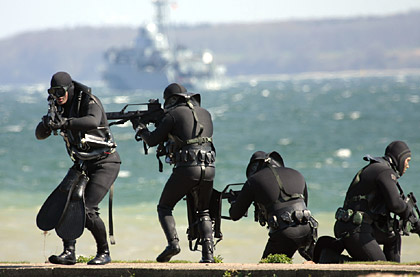
Wie man Kampfschwimmer „macht“ …
Kampfschwimmer training lasts three years. Next to pilot training it is one of the longest, most expensive and physically most demanding training programs of the German armed forces. Aside from the overall physical and psychological burdens of the training, the element of water constitutes the trainees greatest challenge. This is what differentiates Kampfschwimmer training from all other training programs of the armed forces. Water saps the trainees’ strength, creates anxiety, and teaches humility.
The curriculum teaches the trainees to cope with constant cold and wetness, and to use the water’s characteristics to their own advantage. They learn to read surface and subsurface currents, the weather, wave and wind patterns, and to incorporate these into their mission planning. Kampfschwimmer live on, in, below and with the water. The water becomes their ally!
Another ally is the night. It surrounds, protects and hides the Kampfschwimmer’s actions in the water, on land or from the air. Both elements – water and darkness – enter the trainees life (usually simultaneously) on day one.
Water, darkness, cold and wetness are simultaneously the greatest stress factors. As is the fear of drowning, which is automatically guided by the Amygdala, the brain’s fear center. Jojtly these stressors influence thoughts and actions. Experience has shown that such stressors can break people. For that reason certain elements of training, when observed by outsiders, can appear inhumane. One example: being thrown into the water at night with arms and legs tied. This takes place under controlled conditions, with safety measures in place. But the trainee must rely only on himself. Passing this test provides a tremendous boost to moral and increases self-confidence.
In principle, training at this level – whether to become a naval commando, paratroop, or sharpshooter – is never a bad thing. But training only imparts the foundations, the basic skills, which enable the service member to take focused action. What counts is how these skills are construed and how they are applied later in training and in real-world operations. Another example: Kampfschwimmer candidates receive parachute training at the German armed forces’ airborne/airmobile school in Altenstadt, earning their formal qualification for manual opening parachute operations. Once assigned to the Kampfschwimmer unit, they will jump from aircraft wearing their complete dive gear, execute a perfect landing into the ocean, and execute a three hour underwater mission. During this mission they will covertly attach explosives to a ship, then egress undetected to the open sea to be picked up by a submarine. Good training provides the foundation for executing complex procedures.
In naval commando training, determination is the decisive factor: the will to learn, courage, perseverance, in short the stamina with which a goal is pursued. The level of determination will decide whether a candidate succeeds or gives up. The trainee must absorb knowledge like a sponge. Then he must have the courage and skill to call upon that learning and implement it at the right time and place. All Kampfschwimmer candidates receive the same training and are held to the same standards, but some prevail while other – sometimes physically much stronger – candidates don’t pass. Why is this so? No one really knows.
The progressive training or “easy to hard” principle is systematically applied in the Kampfschwimmer training program. Every day small deviations are inserted into familiar or already practiced routines; scenarios are expended. While this is practiced in all military training programs, it occurs faster in Kampfschwimmer training, incorporating more intense pressure and adding an additional stressor: uncertainty.
Only the instructors and leadership know where the training plan is headed. The trainees must learn to live with this uncertainty. Stress tolerance and acceptance of uncertainty lead to operators who can deal calmly and securely with disruptions in the field.
















